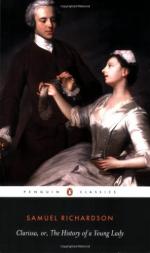[However, I think, I have an expedient for this, if your lady continues to be very desirous of her uncle’s presence (except he should be more determined than his answer to me seemed to import); of which I shall acquaint you, and perhaps of what he says to it, when I have the pleasure to see you in town. But, indeed, I think you have no time to lose. Mr. Harlowe is impatient to hear, that you are actually one; and I hope I may carry him down word, when I leave you next, that I saw the ceremony performed.]
[If any obstacle arises from the lady, (from you it cannot,) I shall be tempted to think a little hardly of her punctilio.]
Mr. Harlowe hopes, Sir, that you will rather take pains to avoid, than to meet, this violent young man. He has the better opinion of you, let me tell you, Sir, from the account I gave him of your moderation and politeness; neither of which are qualities with his nephew. But we have all of us something to amend.
You cannot imagine how dearly my friend still loves this excellent niece of his.—I will give you an instance of it, which affected me a good deal—–’If once more, said he, (the last time but one we were together,) I can but see this sweet child gracing the upper end of my table, as mistress of my house, in my allotted month; all the rest of my family present but as her guests; for so I formerly would have it; and had her mother’s consent for it—’ There he stopt; for he was forced to turn his reverend face from me. Tears ran down his cheeks. Fain would he have hid them: but he could not—’Yet—yet, said he—how—how—’ [poor gentleman, he perfectly sobbed,] ’how shall I be able to bear the first meeting!’
I bless God I am no hard-hearted man, Mr. Lovelace: my eyes showed to my worthy friend, that he had no reason to be ashamed of his humanity before me.
I will put an end to this long epistle. Be pleased to make my compliments acceptable to the most excellent of women; as well as believe me to be,
Dear Sir,
Your faithful friend, and humble servant,
Antony Tomlinson.
***
During the conversation between me and the women, I had planted myself at the farthest end of the apartment we were in, over against the door, which was open; and opposite to the lady’s chamber-door, which was shut. I spoke so low that it was impossible for her, at that distance, to hear what we said; and in this situation I could see if her door was opened.
I told the women, that what I had mentioned to my spouse of Lady Betty’s coming to town with her niece Montague, and of their intention to visit my beloved, whom they had never seen, nor she them, was real; and that I expected news of their arrival every hour. I then showed them copies of the other two letters, which I had left with her; the one from Lady Betty, the other from my cousin Montague.—And here thou mayest read them if thou wilt.




